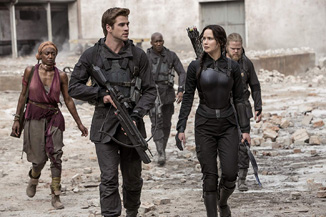The Number One Movie in America - Hunger Games: Mockingjay Part 1
By Sean Collier
November 8, 2019
BoxOfficeProphets.com

Here’s the surprise: Among the “Part 1” films, Hunger Games made the most money.
“The Hunger Games: Mockingjay — Part 1,” released to an eager fanbase on Nov. 21, 2014, had a massive opening weekend haul north of $121 million en route to a $337 million finish; it was the second highest grossing film of the year (after “American Sniper”), and its debut stands as the 34th-largest of all time.
That $337 million figure bests “Harry Potter and the Deathly Hallows — Part 1,” which earned just shy of $296 million. “Breaking Dawn — Part 1,” the penultimate Twilight film, netted $281 million. And “Allegiant,” the first half of the final book in the Divergent series, earned a mere $66 million. (That figure was such a disappointment that the series was never completed, wrapping on the unanswered questions at the end of “Allegiant.”)
How did “Mockingjay — Part 1” manage to best Potter and the vampires? Probably because of the ending of “Catching Fire,” the previous entry in the series. “Catching Fire” is regarded as the best of the Hunger Games adaptations; both its $424 million cume and its 89% score on Rotten Tomatoes are franchise highs. Perhaps more importantly, “Catching Fire” ends on a dramatic cliffhanger without explanation or resolution.
Fans who read the books, of course, knew what was coming. But leaving unfamiliar fans agape seems to have worked; “Mockingjay” arrived with plenty of hype.
Unfortunately, it only partially delivered. As Katniss Everdeen, Jennifer Lawrence is excellent in “Mockingjay — Part 1,” playing her iconic character as a font of exhausted rage, rattled and chained by post-traumatic stress. It’s not particularly fun to watch, however; Lawrence’s performance is real, it’s visceral and it’s more than a bit harrowing.
The story was not at all served by the division of parts. One of the great strengths of Suzanne Collins’ books was their steady structure; in each of the three novels, there’s half a book of setup, then half a book of action. Splitting “Mockingjay” in half robbed the tale of that structure, leaving a film that is nothing but setup. Everything about “Mockingjay — Part 1” is well handled, and an all-star cast — Philip Seymour Hoffman, Julianne Moore, Mahershala Ali, Woody Harrelson, Stanley Tucci, Elizabeth Banks, Jeffrey Wright — keep each moment compelling. Yet the story is little more than people getting ready for action that will not occur before these credits roll.
Perhaps that explains the dramatic reversal of fortune suffered by “Mockingjay — Part 2.” Its $281 million finish a year later is the lowest in the series by more than $50 million. In contrast, both “Breaking Dawn — Part 2” and “Deathly Hallows — Part 2” rose on their predecessors, riding a wave of series-ending excitement; the latter, in fact, is the highest grossing film in the Potter series. With these series, the split parts seemed to amplify anticipation for the final chapter; in the case of Mockingjay’s somber first half, hype was diminished.
The Hunger Games films are worth revisiting; they’re Y.A. dystopia done right, balancing fantastic and realistic elements well. They’re also full of excellent performers. The series’ name value has waned, but perhaps a comeback is on the horizon; a prequel novel, of which a film adaptation is a virtual certainty, is due next year.
“The Hunger Games: Mockingjay — Part 1” is the subject of the latest episode of The Number One Movie in America, a look back at past box-office champions. Each episode’s film is drawn at random from a list of every number-one movie since 1982. Please listen and subscribe!
Next time: Somewhere between Sunrise and Sunset, Richard Linklater just wanted to rock. Fortunately, he had some help from Jack Black.